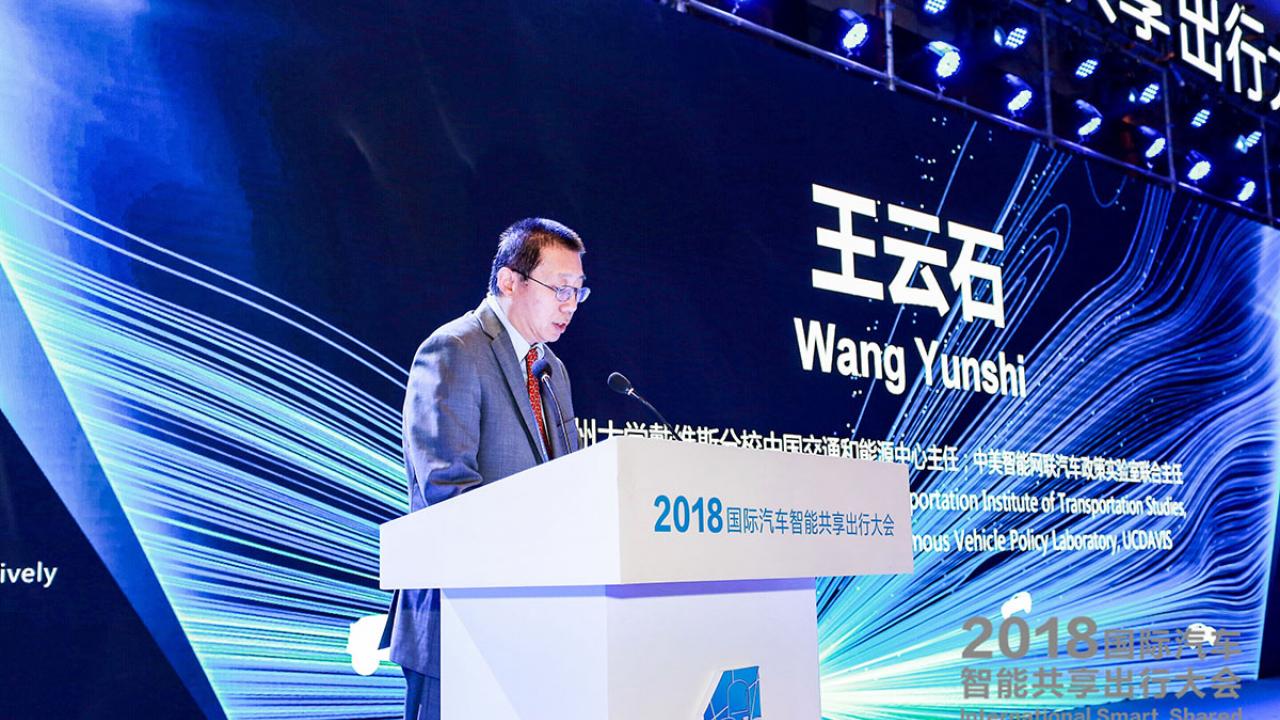
ITS-Davis Representatives Prominent at China’s International Congress on Smart Shared Mobility
At the International Smart Shared Mobility Congress 2018 held in Guangzhou, China on November 20-21, the Institute of Transportation Studies at UC Davis (ITS-Davis) dominated the international speakers’ list. The conference was co-hosted by the Society of Automotive Engineers (SAE) of China and a local government, and it included about 500 participants, from academic institutions, private industry, and government. The speakers included representatives from several international organizations, including the United Nations Industrial Development Organization (UNIDO), the International Energy Agency, and the World Bank. The conference is the first of its kind on the connection between automated vehicles and ridesharing. ITS-Davis was specifically invited to provide insights from our research on these mobility innovations and how to align them with societal benefits.
Prominent participants from ITS-Davis were Yunshi Wang, director of the China Center for Energy and Transportation (C-CET), and Giovanni Circella, director of the 3 Revolutions Future Mobility Program. C-CET Director Wang moderated the session on Policy Innovation and Best Practices. He reported, “The conference highlighted the global educational and research influence of ITS-Davis. People in China look to us for advice on the integration of automated vehicles and ridesharing, and government officials ask for international best policy practices. At the moment, China and California are the leaders in rideshare and vehicle automation, and we intend to help guide the emergence of the new technology towards sustainable pathways.”
Dr. Circella spoke on a panel on shared mobility that included representatives from Japanese and Chinese automakers and mobility companies, research institutes, and governmental agencies. “The panel focused on how on-demand mobility solutions could have a significant impact and a larger market in China than in the U.S., given that car ownership is still lower in China. Thus, significant opportunities exist in China for smart, shared mobility to address transportation problems,” Dr. Circella said. He also gave a presentation of research findings from ITS-Davis on how shared mobility is changing travel behavior and vehicle ownership in the US, and he discussed the potential impact of the three transportation revolutions: automation, electrification, and shared mobility.
Other conference participants with connections to ITS-Davis included Dr. Yaodong Shi, the deputy director-general of the Industrial Research Department of the Development Research Center, a high-level government advisory body. A distinguished visiting scholar at ITS-Davis in 2015, Dr. Shi attended a closed-door session at the conference. Dr. Jacob Teter, an expert from the International Energy Agency, spoke at the plenary session on global electric vehicle development. Dr. Teter earned his Ph.D. from the Transportation Technology and Policy (TTP) program hosted by ITS-Davis. Dr. Daisy Deng, who also recently completed her TTP Ph.D. degree, attended the conference as a representative researcher from the World Bank. One of the conference organizers, Mr. Ruigang Lu, was among the first Chinese visiting scholars at ITS-Davis. He is now the deputy director of the academic department of the SAE-China. In addition, two keynote speakers and a moderator were alumni of UC Berkeley, UC Irvine, and UC Riverside, respectively.
SAE of China plans to make this an annual conference. “We will continue to seize opportunities to share our research results and our policy ideas with our Chinese colleagues, and we will learn from China as well, especially in the area of electrification and ridesharing,” said C-CET Director Wang.
